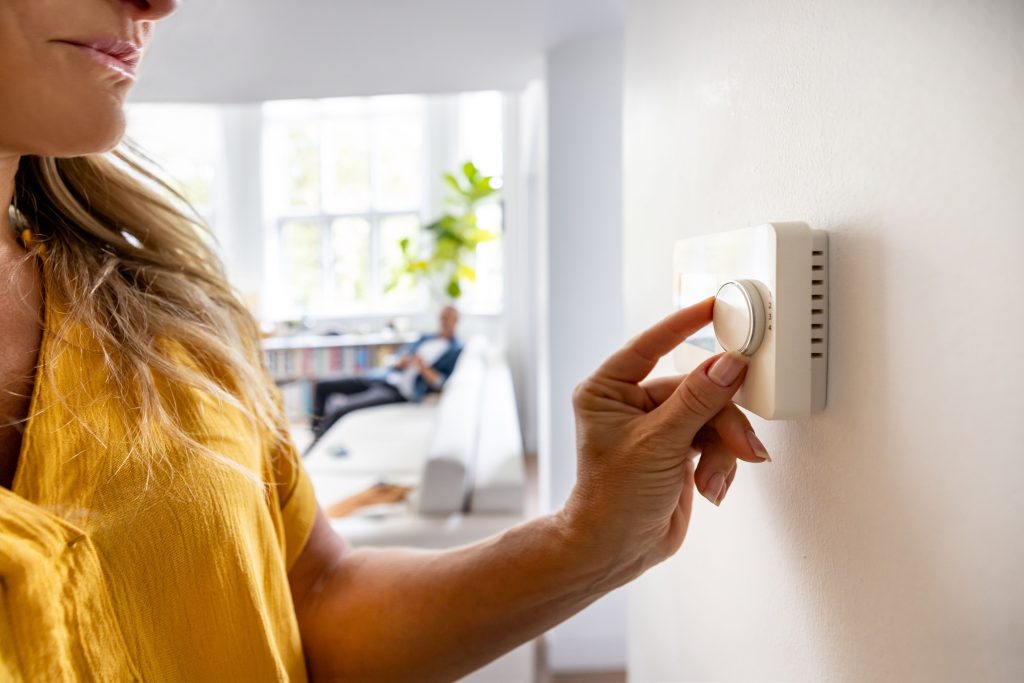:max_bytes(150000):strip_icc():format(jpeg)/GettyImages-1685139704-7e70e9728eb94a0f87f2d76d6a7a0422.jpg)
This summer is the hottest on record (for the third year in a row!), so we assume that your home’s air conditioning system has been hard at work for the past few months. While it might seem tempting to crank the temperature as low as it can go during a heatwave, mistakes like these can cause some severe damage to your system over time.
We spoke to Angie Hicks, co-founder of Angi (formerly Angie’s List), for expert advice on the mistakes homeowners might be making with their AC during a heatwave. Avoiding these errors (and following a few other expert tips Hicks recommends) will help keep your home cool while conserving energy.
What to Never Do with Your AC During a Heatwave
When you leave the house during the summer, do you turn your AC off before you go to conserve energy? If so, you might actually be wasting more energy than you’re saving—not to mention the fact that you’re likely putting extra strain on your air conditioning unit, too.
If you turn your AC off when you leave the house, you might temporarily lower your energy usage while you’re away. However, during that time, you also lose all the cold air your AC has been producing throughout the day, causing your house to return to a very high temperature. When you return and turn your AC unit back on, it has to work twice as hard to cool your home down. This puts unnecessary strain on your home’s air conditioning.
The solution? Hicks says that you should increase the temperature your air conditioning is set to when you leave the house. Hicks recommends raising the temperature by 7 to 10 degrees each time you leave, up to a maximum of 85°F.
“By keeping the AC at a higher temperature, you save energy and create efficiency, but your home can still be cooled down again without using too much energy,” says Hicks. Once you return home, you can lower the temperature of your AC again. This helps you save energy while you’re out, without putting any extra strain on your AC when you return.
What If You’re Leaving Home for a Long Time?
“If you’re leaving your home for longer than a few hours, it’s considered a long period,” says Hicks. Her answer stays the same whether you’re gone for the day or a couple of weeks of vacation—keep your AC on, but at a higher temperature.
While it might seem like it’s a safe bet to conserve energy by turning off your AC when you’re away on vacation, this can actually encourage other home issues to arise in the heat (like humidity and potentially even mold growth). Keeping your home’s temperature set to a maximum of 85°F can help prevent these problems.
How to Prevent Strain on Your AC
When you’re at home, you might consider setting your air conditioning to a slightly lower temperature than you think, especially during a heatwave. “A good temperature setting is about 78 degrees when you’re home and awake,” says Hicks. “When you sleep, you might want to lower this to your comfortable sleeping temperature.”
“It might be tempting to lower your AC in extreme heat, but this can use a lot of extra energy and shorten the lifespan of your AC,” adds Hicks. Keeping your AC set to a higher but still comfortable temperature can help you save money, conserve energy, and keep your AC running smoothly.
Other Habits to Maximize Heatwave Energy Efficiency
Your AC isn’t the only thing that can help keep your home cool during the summer. The more effort you put into utilizing other cooling solutions along with your AC, the less strain you’ll be putting on it—and the more energy you’ll be able to conserve when the temperature spikes outside.
Hicks recommends keeping your blinds closed during the day to block out as much sunlight as possible throughout your home. This will help keep it cooler, especially during extreme heat. She also recommends turning on ceiling fans if you have any; this is a great way to allow cool air to circulate and make your home feel cooler.
According to Hicks, you should also open a window at night if the outside temperature is cooler than the inside temperature. This can help lower the temperature of your space enough that your air conditioning might not even need to turn on during the night.
You can also try other solutions to help prepare your home for a heat wave, such as using cooling sheets, avoiding oven use, and utilizing personal fans to help you feel cooler.
Signs You’ve Been Putting Too Much Strain on Your AC
Your AC has likely been working hard all summer, which means you need to keep a close eye on it and perform regular maintenance to ensure it continues to work correctly. “This means replacing your filters about every three months and getting it tuned up in the fall and spring,” says Hicks. Performing these minor maintenance tasks can help you prevent major issues from arising in the future.
Sometimes, bad luck can strike your AC system during the worst times, especially if you’ve had a habit of cranking the temperature down whenever it’s hot outside.
“If you feel like your system isn’t cooling properly, there are uneven temperatures, you hear funny noises, or smell something different, it could be a sign it isn’t working properly and you should call a technician to check it out,” says Hicks. Catching these signs early and having a professional look at your AC is a good way to prevent your air conditioning from breaking down at the worst time.

